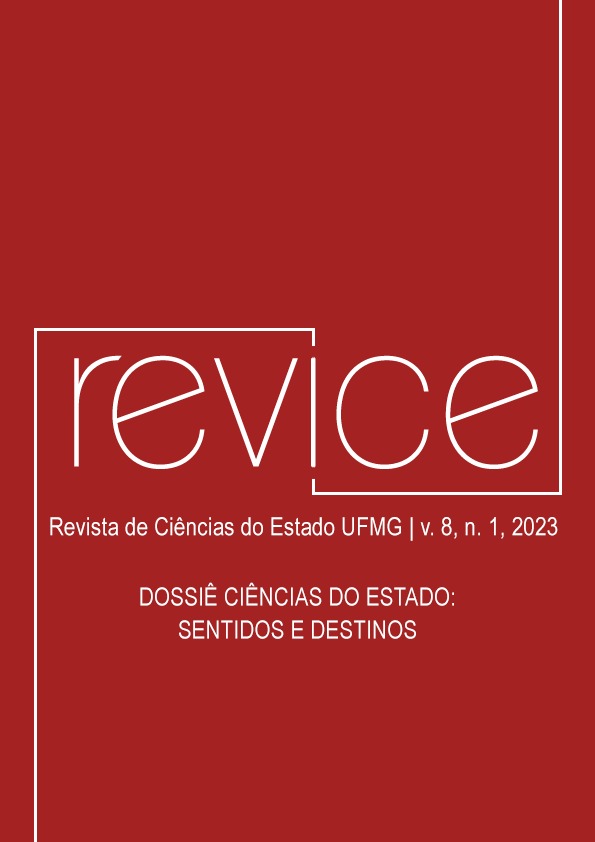The institutional imbalance between the Republican Powers
structural and circumstantial elements and the phenomenon of the judicialization of politics
DOI:
https://doi.org/10.35699/2525-8036.2023.40537Keywords:
Separation of powers, Imbalances, Structural and circumstantial causesAbstract
The current Brazilian State was structured under a constitutional order with a functional division into three bodies, legally called powers. Despite the fact that the constitutional normative organization seeks to ideally reproduce the theoretical plan of the notion of separation of functions and the mechanisms of “checks and balances” between the constituted powers, it is observed that the balance of forces between them in the practical plan of the Brazilian reality demonstrates that this expected balance does not work exactly as abstractly thought, with cases of frank hypertrophy cycles of one power over the others being frequent, or even of general disarray between all the constituted powers, as recently occurred in the case of the judgment by the STF of the secret budget, a matter that involved the simultaneous balance of forces between the three powers, culminating in a scenario that greatly disorganized the proper functioning of the Brazilian State and its institutions. Under these theoretical premises, the objective is to analyze, through a legal-political approach, the contributory elements for the formation of the current dynamic balance of forces that involves the three republican powers. Specifically, the objective is to investigate some of the institutional and political factors that potentially contribute to the imbalance of forces between the powers, seeking to answer whether the imbalance of forces between the powers has circumstantial causalities, at the moment, or if they are due to bad institutional design of the separation of powers, hence of structural causalities. As a methodology, basic bibliographical research is adopted, approaching the themes with a legal-political analysis focus, however without intending to focus on the in-depth theoretical examination of dogmatic categories.
Downloads
References
ABRANCHES, S. H. Presidencialismo de Coalizão: O Dilema Institucional Brasileiro. Dados. Rio de Janeiro, Iuperj, v. 31, n. 1, 1988.
ACKERMAN, Bruce. A Nova Separação dos Poderes. Rio de Janeiro: Lumen Juris, 2009.
ALEXY, Robert. Teoria dos Direitos Fundamentais. 5. Ed. São Paulo: Malheiros, 2008.
ARISTÓTELES. Política. In: Os Pensadores. São Paulo: Nova Cultural, 2000.
BARROSO, Luís Roberto. Constituição, Democracia e Supremacia Judicial: Direito e Política no Brasil Contemporâneo. RFD- Revista da Faculdade de Direito da UERJ, [S.l.], n. 21, jun. 2012.
BASTOS, Ronaldo. O desenho constitucional hiperpresidencialista na América Latina. Revista Direitos Humanos & Sociedade, PPGD UNESC, n. 2, v. 1, 2019.
BRASIL. Constituição (1988). Constituição da República Federativa do Brasil. Brasília, DF: Senado, 1988.
BRASIL. Supremo Tribunal Federal - Mandado de Segurança 23.920/DF. Disponível em: http://www.stf.jus.br/portal/processo/verProcessoAndamento.asp?incidente=1922093. Acessado em: 21 nov. 2016.
CAPPELLETTI, Mauro. Juízes legisladores?. Porto Alegre: S. A. Fabris, 1993.
COMPARATO, Fábio Konder. Ética: direito, moral e religião no mundo moderno. São Paulo: Companhia das Letras, 2006.
CORNEJO, Valentin Thury. Juez y división de poderes hoy. Buenos Aires: Editora Ciudad Argentina, 2002.
DA CUNHA JÚNIOR, Dirley. A Judicialização da Política, a Politização da Justiça e o Papel do Juiz no Estado Constitucional Social e Democrático de Direito. Revista do Programa de Pós-Graduação em Direito, [S. l.], v. 26, n. 28, 2016.
DALLARI, Dalmo de Abreu. O poder dos juízes. 3. ed. São Paulo: Saraiva, 2007.
DWORKIN, Ronald. Uma questão de princípios. Trad. Luís Carlos Borges. São Paulo: Martins Fontes, 2005.
HAMILTON E MADSON. Os Federalistas. Tomo II. Rio de Janeiro: Typ. Imp. e Const. De J. Villeneuve e Comp, 1840. Biblioteca digital Câmara dos Deputados. Disponível em:<http://bd.camara.gov.br/bd/handle/bdcamara/17661>. Acesso em 20 jun 2020.
LIMONGI, Fernando de Magalhães Papaterra. A democracia no Brasil: presidencialismo, coalizão partidária e processo decisório. Novos Estudos, n. 76, p. 17-41, 2006.
MOISÉS, José Álvaro. O desempenho do Congresso no Presidencialismo de Coalizão. In: MOISÉS, José Álvaro [org.]. O papel do Congresso Nacional no presidencialismo de coalizão. Rio de Janeiro: Konrad-Adenauer-Stiftung, 2011.
MONTESQUIEU, Charles de Secondat. O Espírito das Leis. Introdução, trad. e notas de Pedro Vieira Mota. 7ª ed. São Paulo: Saraiva, 2000.
PIÇARRA, Nuno. A separação dos poderes como doutrina e princípio constitucional: um contributo para o estudo das suas origens e evolução. Coimbra: Coimbra Editora, 1988.
RODAS, Sérgio. Congresso é responsável pela judicialização da política, afirma Barroso. Disponível em: http://www.conjur.com.br/2015-ago-19/congresso-responsavel-judicializacao-politica-barroso. Acessado em: 21 jun. 2020.
VILHENA VIEIRA, Oscar. Supremocracia. Revista Direito GV, São Paulo, p. 441-464, Jul-Dez 2008.
Downloads
Published
How to Cite
Issue
Section
License
Copyright (c) 2023 Tibério Celso Gomes dos Santos

This work is licensed under a Creative Commons Attribution-NonCommercial-ShareAlike 4.0 International License.
1. Os conteúdos dos trabalhos são de exclusiva responsabilidade de seu autor.
2. É permitida a reprodução total ou parcial dos trabalhos publicados na Revista, desde que citada a fonte.
3. Ao submeterem seus trabalhos à Revista os autores certificam que os mesmos são de autoria própria e inéditos (não publicados em qualquer meio digital ou impresso).
4. Os direitos autorais dos artigos publicados na Revista são do autor, com direitos de primeira publicação reservados para este periódico.
5. Para fins de divulgação, a Revista poderá replicar os trabalhos publicados nesta revista em outros meios de comunicação como, por exemplo, redes sociais (Facebook, Academia.Edu, etc).
6. A Revista é de acesso público, portanto, os autores que submetem trabalhos concordam que os mesmos são de uso gratuito.
7. Constatando qualquer ilegalidade, fraude, ou outra atitude que coloque em dúvida a lisura da publicação, em especial a prática de plágio, o trabalho estará automaticamente rejeitado.
8. Caso o trabalho já tenha sido publicado, será imediatamente retirado da base da revista, sendo proibida sua posterior citação vinculada a ela e, no número seguinte em que ocorreu a publicação, será comunicado o cancelamento da referida publicação. Em caso de deflagração do procedimento para a retratação do trabalho, os autores serão previamente informados, sendo-lhe garantido o direito à ampla defesa.
9. Os dados pessoais fornecidos pelos autores serão utilizados exclusivamente para os serviços prestados por essa publicação, não sendo disponibilizados para outras finalidades ou a terceiros.


